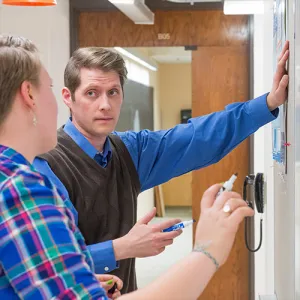
Physics
Smith College physics provides integrated, hands-on learning, supportive professors and fellow physics majors, real research projects and great physics toys.
The physics department offers a rigorous curriculum that pairs innovative teaching techniques with a supportive and close-knit community of faculty, staff and students. Students often double major with astronomy, computer science, math, engineering, chemistry and architecture. You can carry out leading-edge research on your own or in collaboration with faculty starting your first year. Faculty research interests include nonlinear optics, experimental and computational condensed matter physics, complex fluids, molecular materials, low-dimensional systems, cold atom physics and cosmology.
Requirements & Courses
Goals for Majors in Physics
Smith College physics majors graduate with a combination of disciplinary knowledge and skills that prepares them for graduate work in physics or other STEM fields, medical school, teaching, science policy and a variety of other career options.
The primary areas of knowledge covered by our major are mechanics, electricity and magnetism, quantum mechanics and thermal physics. Students will gain a good introductory knowledge of electronics, special relativity, optics, fluids and error analysis. In addition to these physical topics, our students need to master a variety of mathematical topics required in these fields.
At least as important as disciplinary knowledge are the skills required for a degree in physics. These include (but are not limited to) the following:
- Good problem-solving technique, including identification of physical principles, good use of diagrams, clear mathematical derivations, proper use of units, and physical analysis and assessment of results.
- Ability to convey knowledge and observations in both oral and written forms.
- Use of computer-based numerical and analytical methods to solve complex physical problems.
- Gain insight through the use of experimental design, instrumentation and methods that reveal signal and reduce noise in messy data.
- Reproducible data analysis, including the use of software for graphing, curve fitting, and basic statistical analysis to draw conclusions and infer significance.
The Education Track
Students who choose the education track in the physics major may learn some topics at a more introductory level in some areas than it would be for a regular major, but they should still gain facility with all of the topics listed above, except, in some cases, thermal physics. They should also get a good working knowledge of the main ideas to emerge from physics education research. They should become proficient in all the skills listed above as well as tutoring and providing in-class help to students.
Entering students planning to major in physics should take either PHY 117 or PHY 119 in the first year along with one or more courses in the Calculus I, Calculus II, Calculus III mathematics sequence, as appropriate. Students entering with a particularly strong background in physics should confer with a member of the department about the most appropriate course for them in this sequence.
Physics Major
Requirements
- Introductory courses. One of:
- PHY 111 and PHY 113; and PHY 112 or PHY 114; or
- PHY 117 and PHY 118; or
- PHY 119
- Three intermediate courses:
- PHY 210
- PHY 215
- PHY 240
- Two 300-level “main sequence” theory courses: PHY 317, PHY 318, PHY 319, PHY 327
- One advanced experimental course: PHY 350
- One advanced theoretical course. One of:
- One topic of PHY 360
- One approved 300-level alternative in physics or a related field
- In years in which a topic of PHY 360 is not offered, either:
- A third or fourth course from the "main sequence" theory courses, or
- Substitution of PHY 211 or PHY 242
Physics Major with Education Track
Besides the standard physics major, we also offer a physics education track within the major. The regular major track includes 300-level course requirements necessary for preparation for graduate school. The education track replaces some of the upper level courses with courses in physics pedagogy and education, and engages students in practical experience in the physics classroom. Students interested in teaching and science journalism should consider this track.
Requirements
- Introductory physics courses. Either:
- PHY 111 and PHY 113 and one of the following: PHY 112, PHY 114 or equivalent
- PHY 117 and PHY 118; or
- PHY 119
- PHY 210, PHY 215, PHY 240, PHY 300 (at least twice) and PHY 301
- One of the following: PHY 317, PHY 318, PHY 319, PHY 327
- One astronomy course: AST 111
- Two education courses: EDC 238 and one other education course (EDC 390 recommended)
Note: This track does not lead to educator licensure. Students who wish to satisfy licensure requirements should consult with a faculty member of the Department of Education and Child Study.
Major Requirement Details
- Students with scores of 4 and 5 on the Advancement Placement tests in physics B and C may apply that credit toward the major unless they complete the corresponding Smith introductory courses for credit.
- S/U grading is not permitted for major requirements, except for classes designated as S/U only.
- Students double majoring in engineering may substitute EGR 220 for PHY 240 but are encouraged to take both.
- Students are advised to check with members of the physics department to choose appropriate course substitutions; other courses may qualify with advance permission of the department.
- Physics majors are advised to acquire a facility in scientific computing and numerical analysis (e.g., PHY 211).
- Physics majors are advised to learn to design and fabricate a working tool, instrument or device in the Center for Design and Fabrication.
- Students planning graduate study in physics are advised to take all 300-level physics course offerings.
Physics Minor
Requirements
- Introductory sequence. One of:
- PHY 111 and PHY 113 and one of the following: PHY 112, PHY 114 or equivalent
- PHY 117 plus PHY 118; or
- PHY 119
- PHY 215
- Three 200- or 300-level electives (12 credits)
- When appropriate, and with prior approval by the minor adviser, one qualifying course in the student’s major can be substituted for one of the three physics electives required for the physics minor.
- Physics minors are advised to acquire a facility in scientific computing and numerical analysis (e.g., PHY 211).
- Physics minors are advised to learn to design and fabricate a working tool, instrument or device in the Center for Design and Fabrication.
Courses
PHY 110 Energy, Environment and Climate (4 Credits)
Earth’s reliance on carbon-based, non-renewable energy sources comes at a severe environmental, economic and political cost. Are there alternatives? This course offers a hands-on exploration of renewable energy technologies with an emphasis on understanding the underlying scientific principles. Students assess worldwide energy demand; study the limits to improved energy efficiency; explore the science and technology of solar, wind and hydropower; understand the science behind global warming; investigate climate models; and evaluate strategies for a sustainable future. This course also includes in-class experiments and field trips. Natural Science
Fall, Spring, Variable
PHY 111 Living Physics I (4 Credits)
First semester of an algebra-based introductory physics course with an emphasis on biological and chemical systems. Topics include: the modeling of physical interactions in terms of mechanical and electrical forces; random motion and diffusion; mechanical properties of cells; fluid flow, viscosity and surface tension; energy transfers due to mechanical movement; the formation and breaking of chemical bonds; and temperature gradients. This course includes a full lab component, integrated into the regular class meeting times, as well as in-class review of all necessary mathematics with a focus on the use of math to represent information in the physical world (physical modeling). Restrictions: Not open to students who have taken PHY 117. Enrollment limited to 28. (E) Natural Science
Fall
PHY 112 Mathematics of Living Physics I (1 Credit)
This course is an optional supplement to PHY 111. It is designed for students requiring a calculus-based course to meet major or professional school requirements as well as anyone interested in exploring the subject in more depth mathematically. The two foci of this course are: (1) the use of calculus in mathematical modeling of the physics underlying common biological and chemical processes considered in PHY 111 and (2) the physical insights that can be gained through this analysis. Previous coursework in calculus is required, but the course includes in-class review of all necessary mathematics. S/U only. Corequisite: PHY 111. (E) Natural Science
Fall
PHY 113 Living Physics II (4 Credits)
Second semester of an algebra-based introductory physics course with an emphasis on biological and chemical systems. Topics include: thermal energy, enthalpy and Gibbs free energy; probability and the Boltzmann distribution; electric fields, capacitance and potential differences across cell membranes; electric currents and charge flow, including electrical properties of nerve cells; oscillations and waves, including biochemical oscillations; the ray model of light and optics; the wave model of light and the electromagnetic spectrum; the photon model of light, including fluorescence. This course includes a full lab component, as well as in-class mathematics review with a focus on the use of math in the physical world (physical modeling.) Prerequisite: PHY 111. Enrollment limited to 28. (E) Natural Science
Spring
PHY 114 Mathematics of Living Physics II (1 Credit)
This course is an optional supplement to PHY 113. It is designed for students requiring a calculus-based course to meet major or professional school requirements as well as anyone interested in exploring the subject in more depth mathematically. The two foci of this course are: (1) the use of calculus in mathematical modeling of the physics underlying common biological and chemical processes considered in PHY 113 and (2) the physical insights that can be gained through this analysis. The course includes in-class review of all necessary mathematics. PHY 112 recommended. S/U only. Corequisite: PHY 113. (E)
Spring
PHY 115 Quantitative Approaches to Physics (1 Credit)
Science blends physical knowledge with mathematical knowledge. This blending changes the meaning attached to math and even the way mathematical equations are interpreted. Learning to think about physics with math involves a number of scientific thinking skills that are rarely taught in introductory classes. Students in this course explicitly learn and practice these skills through individual and group work in a small class setting. Students are recommended for this course on the basis of a short placement test available before registration and again at the start of classes. Successful completion of PHY 115 or the placement test is required to enter any PHY courses with a PHY 117 prerequisite. S/U only. Prerequisite: PHY 117 must be taken concurrently. (E)
Fall, Spring
PHY 117 Introductory Physics I (5 Credits)
The concepts and relations (force, energy and momentum) describing physical interactions and the changes in motion they produce, along with applications to the physical and life sciences. Lab experiments, lectures and problem-solving activities are interwoven into each class. In-class discussion sections offer additional help with mathematics, data analysis and problem solving. This course satisfies medical school and engineering requirements for an introductory physics I course with a lab. Prerequisite: PHY 115 (taken concurrently) or Physics math placement test; and MTH 111 or equivalent. Restrictions: Not open to students who have taken PHY 111 or PHY 119. Enrollment limited to 28. Natural Science
Fall, Spring
PHY 118 Introductory Physics II (5 Credits)
The concepts and relations (force fields, energy fields and potentials) underlying electrical, magnetic and gravitational interactions, as well as an exploration of simple harmonic motion, oscillations and waves. Lab experiments are integrated into the in-class lectures, discussions and problem solving activities. Satisfies medical school and engineering requirements for an introductory physics II course with lab. Prerequisite: PHY 117 or equivalent. Restrictions: Not open to students who have taken PHY 113 or PHY 119. Enrollment limited to 28. Natural Science
Fall, Spring
PHY 119 Advanced Introductory Physics (5 Credits)
This course is designed for incoming students who have significant prior experience with the topics covered in PHY 117 (Newtonian mechanics) and PHY 118 (electricity and magnetism), but who nevertheless would benefit from a course in introductory physics at the college level. Students develop their problem-solving, experimental-design, data-analysis, scientific- computing and communication skills on a variety of more advanced applications of the standard introductory physics topics related to mechanics and E & M. Specific applications may include the physics of the solar system(s), numerical solution of F=ma, the atomic theory of matter, the laws of thermodynamics, electric circuits and electromagnetic waves. Prerequisite: MTH 111 or equivalent. Restrictions: Not open to students who have taken PHY 111, PHY 112, PHY 117 or PHY 118. Enrollment limited to 28. Instructor permission required. Natural Science
Fall
PHY 210 Mathematical Methods of Physical Sciences and Engineering (4 Credits)
This course covers a variety of math topics of particular use to physics and engineering students. Topics investigated in class include ordinary differential equations, linear algebra, Fourier analysis, partial differential equations and a review of multivariate calculus, with particular focus on physical interpretation and application. A working knowledge of differential and integral calculus, Taylor series expansions, complex numbers, and partial derivatives is assumed. Students can arrange to work independently with the instructor in a review of these prerequisites if needed. Prerequisites: MTH 212 and (PHY 111, PHY 117 or PHY 119) or equivalent. Enrollment limited to 30. Natural Science; Mathematics
Fall, Spring
PHY 211 Computational Methods in the Physical Sciences (4 Credits)
This course provides an overview of commonly used computational methods and their applications to physics problems. Using the Python programming language, students begin with learning how programs send instructions to computers, move on to simple data visualization, error analysis and uncertainty in computational calculations, and then progress to numerical integration and differentiation, machine learning and stochastic methods. In each case, students examine the method’s applications to relevant physics scenarios. This course is project-based, with multiple short projects throughout the semester intended to build the skills and generate a set of modules that can be used as part of a final project applying a computational method to an appropriate physics problem of the student’s choice. Prerequisites: (PHY 113 and PHY 114) or (PHY 118 or PHY 119); and MTH 112. Enrollment limited to 30. Natural Science; Mathematics
Fall, Spring
PHY 215 Light, Relativity, and Quantum Physics (4 Credits)
The special theory of relativity, the wave equation and mathematics of waves, optical phenomena of interference and diffraction, particle and wave models of matter and radiation, Bohr model of atomic structure, introduction to fundamental principles and problems in quantum mechanics, and introduction to nuclear physics. Prerequisites: [(PHY 113 and PHY 114) or (PHY 118 or PHY 119)]; and MTH 112. Natural Science
Spring
PHY 240 Electronics (4 Credits)
A semester of experiments in electronics, with emphasis on designing, building, making measurements, and trouble-shooting circuits. Analog circuits: filters, AC circuits, operational amplifiers, semiconductors, and microcontrollers. Final individual or small group design project. Priority given to physics majors and minors, and students planning to major or minor in Physics. Prerequisite: (PHY 113 and PHY 114) or (PHY 118 or PHY 119), or equivalent. Enrollment limited to 18. Instructor permission required. Natural Science
Fall
PHY 242 Research in High Precision Spectroscopy (3 Credits)
This course gives students a practical introduction to experimental atomic physics by having students do real, publishable research. While this course-based research program is focused on high precision spectroscopy, students gain skills that can be generally applied to investigational science in experimental design, experimental iteration, and systematic error analysis, data analysis, and writing scientific papers for publication. In addition, students learn about basic atomic physics and quantum mechanics, atom and light interactions, and optics, and they gain a basic understanding in how experiment and theory interact to further the knowledge of nature. Corequisite: PHY 242L. Enrollment limited to 12. Natural Science
Fall, Spring, Variable
PHY 242L Laboratory in High Precision Spectroscopy (1 Credit)
This lab course gives students a practical introduction to experimental atomic physics by having students do real, publishable research. While this course-based research program is focused on high precision spectroscopy, students gain skills that can be generally applied to investigational science in experimental design, experimental iteration and systematic error analysis, data analysis, and writing scientific papers for publication. In addition, students learn about basic atomic physics and quantum mechanics, atom and light interactions, and optics, and they gain a basic understanding in how experiment and theory interact to further the knowledge of nature. Corequisite: PHY 242. Enrollment limited to 4.
Fall, Spring, Variable
PHY 300 Physics Pedagogy: Theory (2 Credits)
A course emphasizing the pedagogy in physics based on Physics Education Research (PER). Readings and discussion emphasize the research literature and strategies for implementing successful and effective methods of teaching physics at the introductory level in the classroom. May be repeated once for credit. S/U only. Prerequisites: (PHY 111 and PHY 112) or (PHY 113 and PHY 114) or (PHY 117 or PHY 119). Instructor permission required. Natural Science
Fall, Spring
PHY 301 Physics Pedagogy: Practicum (2 Credits)
A practicum course involving actual classroom experience in implementing methods of teaching based on Physics Education Research (PER). Students have direct interaction with learners in the classroom during group activities, laboratory exercises and problem-solving. May be repeated once for credit. Corequisite: PHY 300. Prerequisites: (PHY 111 and PHY 112) or (PHY 113 and PHY 114) or (PHY 117 or PHY 119. Instructor permission required. Natural Science
Fall, Spring
PHY 317 Classical Mechanics (4 Credits)
Newtonian and Lagrangian dynamics of particles and rigid bodies, oscillations and planetary orbits. Prerequisite: PHY 210 and PHY 215, or equivalent. Natural Science
Fall
PHY 318 Electricity and Magnetism (4 Credits)
Introduction to (relativistic) local field theory. Electrostatic and magnetostatic fields in vacuum and in matter, Maxwell’s equations of electrodynamics and electromagnetic waves. Prerequisite: PHY 210 and PHY 215, or equivalent. Natural Science
Fall, Spring, Alternate Years
PHY 319 Thermal Physics (4 Credits)
Introduction to statistical mechanics and thermodynamics. Prerequisites: PHY 210 and PHY 215, or equivalent. Natural Science
Fall, Spring, Alternate Years
PHY 327 Quantum Mechanics (4 Credits)
The formal structure of nonrelativistic quantum mechanics, including operator methods. Wave packets; quantum mechanical scattering and tunneling; central potentials; matrix mechanics of spin, addition of angular momenta; corrections to the hydrogen spectrum; identical particles and exchange symmetry; EPR paradox, Bell’s Theorem and the interpretation of quantum mechanics. Prerequisites: PHY 210 and PHY 215, or equivalent. PHY 317 recommended. Natural Science
Spring
PHY 350 Experimental Physics (4 Credits)
An advanced laboratory course for juniors and seniors in which students learn and make use of advanced signal recovery methods to design and perform laboratory experiments drawn from a wide range of topics in modern and contemporary physics. Students planning on special studies or honors work in experimental physics as seniors should take PHY 350 during their junior year. Prerequisites: PHY 210, PHY 215 and PHY 240, or equivalent. Enrollment limited to 12. Natural Science
Spring
PHY 360gr Advanced Topics in Physics-General Relativity (4 Credits)
This course covers the basics of general relativity. The class discusses tensors and metric spaces and re-frames special relativity in those terms. Students then generalize the rules of special relativity to non-inertial frames and use the equivalence principle to extend those ideas to spaces with gravitational fields. The class explores “Einstein’s equation” relating matter and geometry. Finally, students discuss basic applications, including black holes, gravitational waves and cosmology. Prerequisites: PHY 210 and PHY 215, or equivalent. Natural Science
Fall, Spring, Variable
PHY 360op Advanced Topics in Physics-Optics (4 Credits)
Electromagnetic waves; polarization and polarizing devices; reflection and refraction at interfaces; optical properties of dielectrics and metals; birefringent materials and devices; multiple beam interference and interferometers; diffraction and optical resolution; lasers. Prerequisite: PHY 210. Natural Science
Fall, Spring, Variable
PHY 399 Current PhysicsLiterature (2 Credits)
For this course we read articles and attend talks on diverse topics in physics; attendance at bi-weekly Physics Seminars is required. The emphasis is put on oral presentation and discussion of the new phenomena using knowledge from other physics courses. Prerequisite: PHY 215, or equivalent. Restrictions: Juniors and seniors only. Enrollment limited to 8. Natural Science
Fall, Spring, Variable
PHY 400 Special Studies (1-4 Credits)
Instructor permission required.
Fall, Spring
PHY 430D Honors Project (4 Credits)
Department permission required.
Fall, Spring
PHY 432D Honors Project (6 Credits)
This is a full-year course. Department permission required.
Fall, Spring
Additional Programmatic Information
Director: Will Raven
wraven@smith.edu
Students can apply to complete honors, which involves working on an independent thesis project with one of the faculty members of the department. The completion of the thesis work will lead to a bachelor of arts degree with a notation of "Honors," "High Honors" or "Highest Honors." Look for information about how to apply, the timelines, dates and eligibility on the class deans website.
For the physics department, the eligibility criterion are as follows: GPA: π outside the major and 1.1π in the major
Honors in Your Senior Year
If you would like to do a thesis project in your senior year, talk to the faculty in the department to find out about their research and get an early start. Although not absolutely essential, it helps to get a head start with semester/summer projects with the faculty. Once you and your faculty project adviser have discussed and agreed to this, you have to wait to apply to enter departmental honors at the start of your senior year. The application deadline is within the first week of classes. Give the proposal and application priority when you return to campus. Once your proposal is approved by your department or program and the Subcommittee on Honors and Independent Programs (SHIP), you will get automatically officially registered in the course. This usually happens during the third week of the semester in which you start your thesis.
Students with a 4 or 5 on the AP Physics C mechanics exam are eligible to place out of PHY 117 Introductory Physics I. Students with a 4 or 5 on the AP Physics C electricity and magnetism exam are eligible to place out of PHY 118 Introductory Physics II. Students with a 5, 6, or 7 on the International Baccalaureate (IB) Higher Level Exam or a score of A or B on the International Cambridge A-level exam are strongly encouraged to take PHY 119 Advanced Introductory Physics, which replaces both PHY 117 and PHY 118 for the physics major and also satisfies the PHY 117 requirement for Engineering. Students coming into Smith who have successfully completed a year or more of AP high school physics or equivalent but have not taken the AP, IB, or Cambridge exam should choose between PHY 117 or PHY 119 following a consultation with the instructors of PHY 117 and/or PHY 119. Members of the department are happy to discuss your particular situation further; students are encouraged to stop by with their questions during Conversations.
Faculty
Staff
Ellie Martin-Eberhardt
Laboratory Supervisor
Resources & Opportunities
The best way to get involved in research is to look up the information about the different areas of research that faculty members are pursuing. Interested students are urged to fill out this Google form to apply to join a research lab. You could work with faculty during the semester as research assistants if their grants allow for it or as a special studies for course credit. These often lead to possibilities to do summer research and/or honors theses in the senior year.
Alumnae Spotlight
Alumnae have used their physics undergraduate degree as a springboard to a wide range of careers. About 50 percent of alumnae go on to graduate school in physics or allied fields, such as biophysics, computer science, engineering and material science. Several follow an academic path in research and teaching positions at universities and colleges.
Our majors have an increasing interest in becoming high school teachers. Our introduction of an education track in the major facilitates this career direction. Others have had interesting and diverse career paths in national research labs, R&D in industry, in nonprofit organizations and in corporate and intellectual property law. We have successful entrepreneurs, too.
Contact Department of Physics
McConnell Hall
Smith College
Northampton, MA 01063










